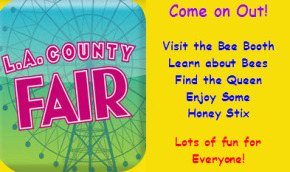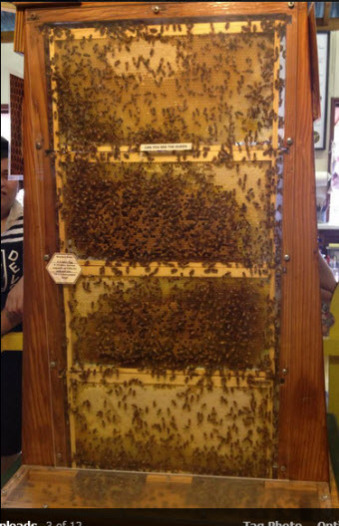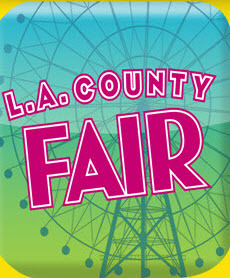LA COUNTY FAIR BEE BOOTH - 9/1/2017-9/24/2017 (Volunteer Sign Up)
/LOS ANGELES COUNTY BEEKEEPERS ASSOCIATION
BEEKEEPERS ASSOCIATION OF SOUTHERN CALIFORNIA
VOLUNTEER SIGN UP AVAILABLE NOW
FOR THE
LOS ANGELES COUNTY FAIR - BEE BOOTH
Pomona Fairgrounds
(Across from the 'Big Red Barn')
1101 West McKinley Ave.
Pomona, CA 91768
http://lacountyfair.com/
Fair Opens Labor Day Weekend (Fri-Mon)
Fair Runs September 1-24, 2017 (Wed-Sun)
From September 1 through September 24, 2017, volunteer members of the Los Angeles County Beekeepers Association and the Beekeepers Association of Southern California will be on hand at the LA County Fair Bee Booth educating thousands of school children and the general public about honeybees and their importance in our lives. The LA County Fair is one of the largest county fairs in the country and the most-visited event in the Los Angeles region in September. It's an end-of-summer tradition for many.
VOLUNTEERS LACBA and BASC Members:
Bee Booth Sign Up: Sign up is available online through Evite. Cyndi Caldera (our splendid Fair Coordinator) has sent out email inviations with the link to Sign Up Now. If you have not received your email invitation by 8/14/17, please contact Cyndi via email at: Cynthia.Alvarado56@yahoo.com and give her your email so she can send you and Evite. If you do not have access to email, you can call Cyndi at 323-243-0756 and you can sign up with her directly. If you have any questions regarding sign up or the fair, please contact Cyndi via email or telephone.
Bee Booth Set Up - 8/26/17 9AM: Come help set up the Bee Booth on 8/26/2017 from 9AM until we're done (approx. mid-afternoon). Enter through Gate 1. Drive to the Bee Booth across from the Big Red Barn. On Bee Booth Set Up Day ONLY you can park near the Bee Booth. There's plenty to do and we have lots of fun!!!
Bee Booth: The fair runs from September 1st-24th (Wed thru Sun) except for Labor Day Weekend (Fri thru Mon). We have 3 shifts per day (no less than 4 volunteers per shift). Shifts available: All Labor Day Weekend and all Saturdays and Sundays: 9:30-1:00, 12:30-5:30, 5:00-10PM. On Wednesdays, Thursdays, and Fridays: 8:30-12:30, 12:00-5:30, 5:00-10.
Bee Booth Take Down - 8/24/2017: We start taking down the Bee Booth in the evening. The more help we have, the quicker we're done. We need to be finished and off the fair grounds by 11PM.
Parking:
Lot 9 (across the street from the fair): Walk across the street, enter through the gate, go under the tunnel, turn right. We're across from the Big Red Barn.
Lot 17: Go across the race track to the far side of the Big Red Barn.
Tickets: Tickets will be at WILL CALL at the McKinley Entrance. They will be under Bee Booth Exhibit under your name. Please allow approx. 15 min. to get your tickets.
Come help educate your community about bees! Mingle with fellow beekeepers! You'll learn more than you could ever imagine about bees by being a part of the LA County Fair Bee Booth. This is a great opportunity to share what you've learned in Beekeeping Class 101. We guarantee you won't be bored. And we could use your help!
We had a great time at last year's fair. See our 2016 Bee Booth Photo Album on Facebook.

Gather round our fabulous HONEY BEE OBSERVATION HIVE. See if you can FIND THE QUEEN! Let us spark your interest in honey bees, their amazing lifestyle and social structure, how they help feed the world, how they have survived for millions of years, and learn what you can do to help the bees.
Honeybees are responsible for nearly 1/3 of our entire diet in regards to the pollination services they provide for a large majority of fruits, vegetables, nuts and legumes.
On view is the beautiful honey bee photography by international photojournalist & bee photographer Kodua Galieti http://www.koduaphotography.com/
HONEY! HONEY! HONEY!
Delicious pure, natural, 100% raw local honey direct from Los Angeles County beekeepers.
HONEY STIX in delightful colors, YUMMY flavors!














